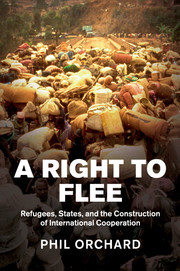Description
A Right to Flee
Refugees, States, and the Construction of International Cooperation
Author: Orchard Phil
This book examines the origins and evolution of refugee protection over the past four centuries.
Language: English
Subject for A Right to Flee:
Approximative price 32.87 €
In Print (Delivery period: 14 days).
Add to cart
A Right to Flee
Publication date: 06-2016
Support: Print on demand
Publication date: 06-2016
Support: Print on demand
Approximative price 105.49 €
In Print (Delivery period: 14 days).
Add to cart
A Right to Flee
Publication date: 10-2014
310 p. · 16x23.4 cm · Hardback
Publication date: 10-2014
310 p. · 16x23.4 cm · Hardback
Description
/li>Contents
/li>Biography
/li>
Why do states protect refugees? In the past twenty years, states have sought to limit access to asylum by increasing their border controls and introducing extraterritorial controls. Yet no state has sought to exit the 1951 Refugee Convention or the broader international refugee regime. This book argues that such international policy shifts represent an ongoing process whereby refugee protection is shaped and redefined by states and other actors. Since the seventeenth century, a mix of collective interests and basic normative understandings held by states created a space for refugees to be separate from other migrants. However, ongoing crisis events undermine these understandings and provide opportunities to reshape how refugees are understood, how they should be protected, and whether protection is a state or multilateral responsibility. Drawing on extensive archival and secondary materials, Phil Orchard examines the interplay among governments, individuals, and international organizations that has shaped how refugees are understood today.
1. Introduction: a right to flee; 2. Structures, agency, and refugee protection; 3. Refugees and the emergence of international society; 4. The nineteenth century: a laissez-faire regime; 5. The interwar refugee regime and the failure of international cooperation; 6. American leadership and the emergence of the postwar regime; 7. The norm entrepreneurship of the United Nations High Commissioner for Refugees; 8. The non-entrée regime; 9. Refugees and state cooperation in international society.
Phil Orchard is a Lecturer in International Relations and Peace and Conflict Studies at the University of Queensland and a Research Associate with the Asia-Pacific Centre for the Responsibility to Protect. He holds a PhD from the University of British Columbia, and previously worked as the Assistant to the Representative of the UN Secretary-General for Internally Displaced Persons. His research focuses on international efforts to provide institutional and legal forms of protection to civilians and forced migrants, and his work has been published in Global Governance, International Affairs, and the Review of International Studies.
© 2024 LAVOISIER S.A.S.




